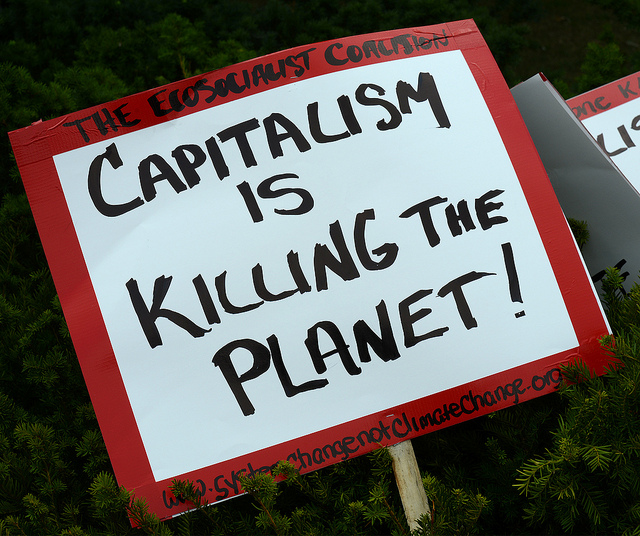
The impact of climate change
Image: by Stephen Melkisethian on Flickr
By Maximilian Van Driessche
Climate change, also known as ‘Global Warming’, is not a new phenomenon. According to scientists, it most likely started in the early 1800s. With a potential rise of 2 to 10 degrees Celsius in the world’s temperature by the end of the century (study conducted by the Intergovernmental Panel on Climate Change or IPCC), we could be in for a rough time. Due to this increase in temperature, there has been a surge in the frequency and severity of extreme weather. This is bound to have an effect on the patterns of crops, wildlife, and our lives, too. The threat to our economic and social organisation would be considerable (Urry, 2010). This is evident in the rise of storms, hurricanes, heat waves and floods that damage property and cause longer dry periods that are an increasing problem for our agricultural economy.
We have our own societies, but so does the Earth. These ‘societies’ come in the form of ecosystems. Plants and animals are vital for our survival, and with the added pressure put on them by global warming, it is making it harder for those that co-exist in particular climate zones (on land an in the ocean). In many parts of the globe, the growing season has been shifted due to warmer temperatures. These warmer temperatures have also lengthened the growing season. As a consequence, plants require more water to grow throughout the season, while at the same time the chances of wildfires and droughts are more likely to increase.
Capitalism’s contribution to climate change
Supposedly, Capitalism is based on the law of supply and demand. This law assumes that every consumer normally evaluates each purchase that they make using a cost benefit analysis (Park, 2015). If you benefit more from buying the item than its actual cost, then you will probably buy it. It is assumed that you want more products, and suppliers only produce at a slower rate on your want. In theory capitalism is the most efficient way of giving you the products you want. We live in a society where we always want more. This idea of supply and demand proves this.
With the pressure on manufacturers to produce more, their regards for the environment are simultaneously thrown out of the window. Industries generate greenhouse gases. One of these is carbon dioxide, which makes 82 percent of greenhouse gases according to the EPA (United States Environmental Protection Agency). Another would be methane, which makes up 10 percent of greenhouse gases. Methane is as effective as carbon dioxide at trapping heat in the atmosphere. Methane is produced through landfills, petrol, coal-mining, and oil production. Our global economy relies heavily on rich cheap oil. ‘Black gold’ is the heart of many industrial, commercial, domestic and agricultural systems. (Urry, 2010).
Effect on society
If you combine the increase in the Earth’s temperature, the dramatical growth of the world’s population and rising sea levels, society could be faced with a lot of issues. The rising sea levels would pose a more significant threat to coastal areas, while the flooding of roads, transit systems and airport runways brought on by intense storms would severely affect the economy and daily life. Furthermore, the supply of clean water is a growing insecurity. A calculated rise of 2.1 degrees Celsius would risk the supply with water for up to 3 billion people. This would also increase the problems with food security, desertification, the rise in the cost of grain and would potentially trigger public unrest. Not only would it affect people living in coastal areas but also those who live in poorer countries. These people would not have the resources needed to adapt to the drastic changes brought on by climate change (rising temperatures, lack of water, etc.). The loss of property would be very likely due to extreme flooding and the increase of hurricanes.
We should also take in the consideration our health and livelihoods. With warmer summers, people will be more prone to heat stroke – and in extreme cases – maybe death. These rising temperatures would also mean an increase in intense droughts, which would result in malnutrition, fresh water would become scarcer.
Solutions?
To conclude, if sociologists had more of a say in these matters, rather than just economists, ecologists and environmentalists, we could show people the effect climate change has and will have on our societies and ways of life. If people were to know what could happen, they might listen.
References/ bibliography
- Brumley, S. (2019) Air Pollution Caused by Industries: January 26th 2019. Available at: https://bizfluent.com/about-5407184-air-pollution-caused-industries.html. (Accessed 6 March 2019).
- Tol, R. (2009). ‘The Economic Effects of Climate Change’,Journal of Economic Perspectives, 23(2) (Spring 2009), pp. 29–51, [Online]. Available at: DOI: https://pubs.aeaweb.org/doi/pdfplus/10.1257/jep.23.2.29. (Accessed 6 March 2019).
- Park, J. (2015). ‘Climate Change and Capitalism’, The Journal of Sustainable Development, 14(2), pp. 189–206, [Online]. Available at: https://consiliencejournal.org/wp-content/uploads/sites/25/2016/09/408-1121-2-PB.pdf. (Accessed 6 March 2019).
- Urry, J. (2010). ‘Sociology and Climate Change’, The Sociological Review, 57, pp. 84-100, [Online]. Available at: https://journals.sagepub.com/doi/pdf/10.1111/j.1467-954X.2010.01887.x. (Accessed 6 March 2019).

0 Comments